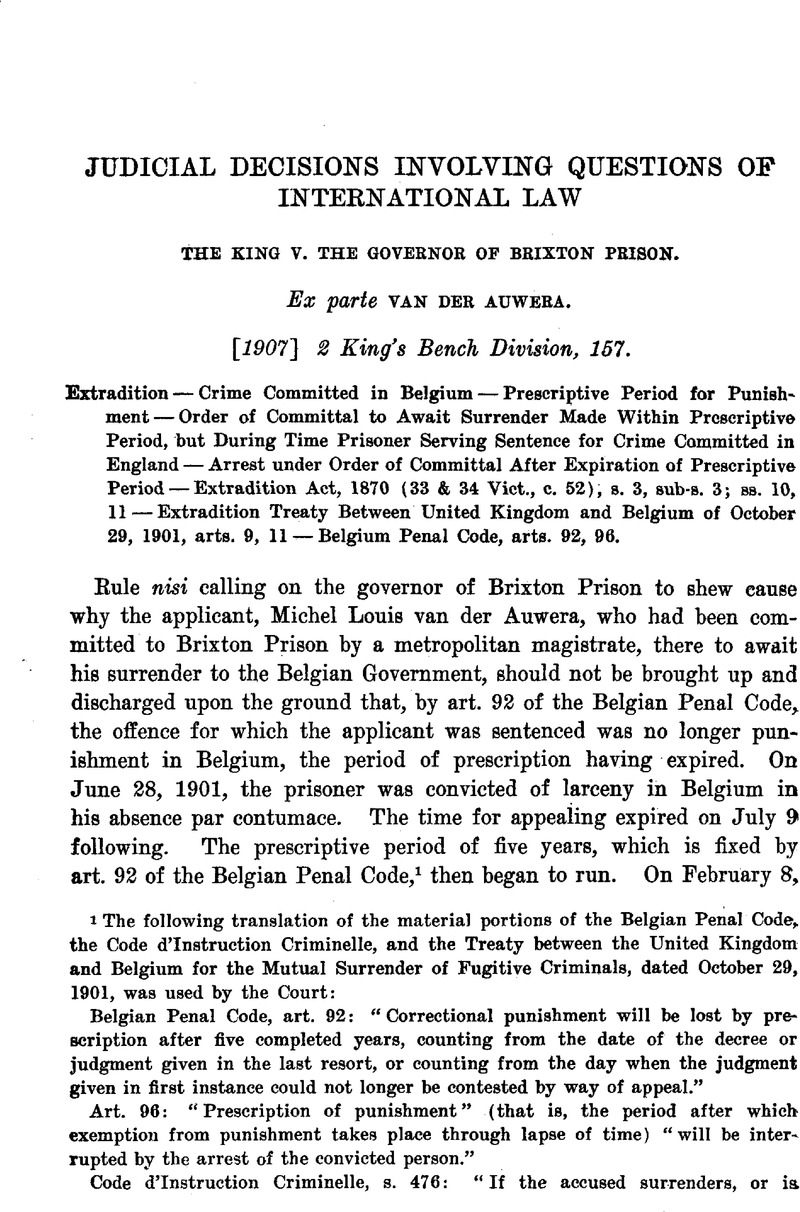No CrossRef data available.
Published online by Cambridge University Press: 04 May 2017

1 The following translation of the material portions of the Belgian Penal Code, the Code d’lnstruction Criminelle, and the Treaty between the United Kingdom and Belgium for the Mutual Surrender of Fugitive Criminals, dated October 29, 1901, was used by the Court:
Belgian Penal Code, art. 92: “ Correctional punishment will be lost by prescription after five completed years, counting from the date of the decree or judgment given in the last resort, or counting from the day when the judgment given in first instance could not longer be contested by way of appeal.”
Art. 96: “Prescription of punishment” (that is, the period after which exemption from punishment takes place through lapse of time) “ will be interrupted by the arrest of the convicted person.”
Code d’Instruction Criminelle, s. 476: “ If the accused surrenders, or is arrested before his sentence has been extinguished by prescription, the judgment by default and all the proceedings against him from the date of the warrant for his arrest * * * shall be nullified as of right, and the case shall be proceeded with in ordinary form.”
Sec. 641: “ In any case, those who have been condemned by default or for contumacy, and whose sentence has been prescribed, shall not be allowed to appear and purge their contempt or contumacy.”
Treaty between the United Kingdom and Belgium for the Mutual Surrender of Fugitive Criminals, dated October 29, 1901, art. 1, clause 29: “ In no case can the surrender be made unless the crime shall be punishable according to the laws in force in both countries with regard to extradition.”
Art. 9: “ The surrender shall not take place if, since the commission of the acts charged, the accusation, or the conviction, exemption from prosecution or punishment, has been acquired by lapse of time, according to the laws of the country where the accused shall have taken refuge.”
Art. 11: “ If the individual claimed should be under process, or condemned by the Courts of the country where he has taken refuge, his surrender may be deferred until he shall have been set at liberty in due course of law. In case he should be proceeded against or detained in such country on account of obligations contracted towards private individuals, his surrender shall, nevertheless, take place, the injured party retaining his right to prosecute his claims before the competent authority.”
Extradition Act, 1870 (33 & 34 Vict., c. 52), s. 3, sub-s. 3: “A fugitive criminal who has been accused of some offence within English jurisdiction, not being the offence for which his surrender is asked, or is undergoing sentence under any conviction in the United Kingdom, shall not be surrendered until after he has been discharged, whether by acquittal or on expiration of his sentence or otherwise.”
See. 10: “ In the case of a fugitive criminal accused of an extradition crime, if the foreign warrant authorizing the arrest of such criminal is duly authenticated, and such evidence is produced as (subject to the provisions of this Act) would, according to the law of England, justify the committal for trial of the prisoner if the crime of which he is accused had been committed in England, the police magistrate shall commit him to prison, but otherwise shall order him to be discharged. In the case of a fugitive criminal alleged to have been convicted of an extradition crime, if such evidence is produced as (subject to the provisions of this Act) would, according to the law of England, prove that the prisoner was convicted of such crime, the police magistrate shall commit him to prison, but otherwise shall order him to be discharged.
“ If he commits such criminal to prison, he shall commit him to the Middlesex House of Detention, or to some other prison in Middlesex, there to await the warrant of a Secretary of State for his surrender, and shall forthwith send to a Secretary of State a certificate of the commital, and such report upon the case as he may think fit.”
Sec. 11: “ If the police magistrate commits a fugitive criminal to prison, he shall inform such criminal that he will not be surrendered until after the expiration of fifteen days, and that he has a right to apply for a writ of habeas corpus.
“ Upon the expiration of the said fifteen days, or, if a writ of habeas corpus is issued, after the decision of the Court upon the return to the writ, as the case may be, or after such further period as may be allowed in either case by a Secretary of State, it shall be lawful for a Secretary of State, by warrant under his hand and seal, to order the fugitive criminal (if not delivered on the decision of the Court) to be surrendered to such person as may in his opinion be duly authorized to receive the fugitive criminal by the foreign State from which the requisition for the surrender proceeded, and such fugitive criminal shall be surrendered accordingly.
“ It shall be lawful for any person to whom such warrant is directed and for the person so authorized as aforesaid to receive, hold in custody, and convey within the jurisdiction of such foreign State the criminal mentioned in the warrant; and if the criminal escapes out of any custody to which he may be delivered on or in pursuance of such warrant, it shall be lawful to retake him in the same manner as any person accused of any crime against the laws of that part of Her Majesty’s dominions to which he escapes may be retaken upon an escape.”